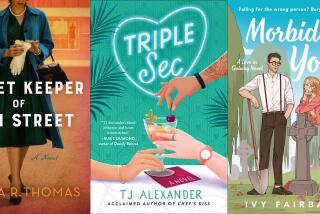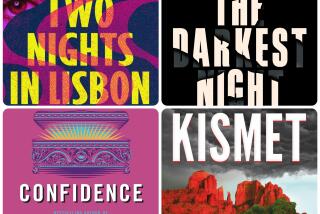Dingbat-Crazy in Love : WILD AT HEART <i> by Barry Gifford (Grove Weidenfeld: $15.95; 159 pp.; 0-8021-1181-5) </i>
- Share via
For such an exceedingly short novel (156 large-type pages), Barry Gifford’s on-the-road chronicle, “Wild at Heart,” sets a remarkably relaxed pace. Laconic and conversational, the book reads like one of Larry McMurtry’s half-improvised epic rambles--which often last about five times longer.
A comparison with McMurtry is high praise coming from me, except that a practitioner of this loose-limbed method really needs to be able to stretch out across the extra pages. As it is, Gifford is just starting to pull us into the world and world-view of his low-rent characters, the Gulf Coast drifter/lovers Sailor Ripley and Lula Paca Fortune, when their wild spree explodes in their faces and the story drifts to a (refreshingly muted) conclusion.
Lula and her ex-con boyfriend (who probably wasn’t actually to blame for killin’ that old boy) are just dingbat-crazy in love but possess none of the resources of character that would help them govern the emotion and learn to live with it. They are adults in their bodies and desires only, still nurturing highfalutin childish ambitions: She wants to be a singer, he an airline pilot. But life seems a lot livelier when they’re together, so Sailor happily breaks parole just to put some distance between the two of them and Lula’s mother, who hired a private eye as soon as she learned they were reattached. (Wouldn’t you?)
“Wild at Heart” is not quite a crime novel. No crime is committed “on camera,” as it were, until the penultimate chapter. It would be the story of grand passion if there were anything remotely grand about the characters.
Gifford’s point about them is also part of the book’s problem: For Sailor and Lula, passion is the sum-total of their identity. “I’m out (of prison) now,” Sailor explains, “and I don’t know what to think about yet”--except her, of course. It’s difficult to fathom his fixation upon a gal who ends way too many of her sentences with question marks to suggest a Southern accent. Like this?
One reason the book never takes hold as any kind of crime or suspense novel is that the pursuing detective, Johnnie Farragut, is a writerly conceit rather than a character. This anti-nemesis retires to his cheap hotel room to read “The Anatomy of Melancholy,” and he writes wry short stories in his spare time. Several of Gifford’s precious few pages are devoted to samples of Johnnie’s art, and they’re not half bad, but their relevance is dubious--especially as the productions of a human red herring, a character who finally has no effect upon the outcome of the story.
The novel’s diminuendo ending, which has the feeling of an epilogue, almost redeems it. It’s a soft closing fillip that is surprising, for once, in a meaningful way. It sidesteps every generic expectation and realigns most of our assessments of the characters.
Gifford has dedicated “Wild at Heart” to the late, great Charles Willeford, whose masterpiece, “Sideswipe,” is a detective story that withholds all detective work until the final chapter. There’s something admirably extreme about stepping into a genre and then leaving out as many generic elements as possible. The form’s apparently spurned conventions are a subliminal shadow presence behind the action, like a haunting memory.
Barry Gifford was the founding editor of Black Lizard Books, the Berkeley reprint house that spearheaded the rediscovery of such masters of high-’50s paperback noir as Jim Thompson, David Goodis and Harry Whittington. And a David Lynch film version of “Wild at Heart,” starring Nicholas Cage and Laura Dern, will be released this summer.
Both of these admittedly extraneous facts promise something darkly peculiar, and Gifford’s achievements are more elusive than that. This is a slender novel in more ways than one, but it has a tart aftertaste.
More to Read
Sign up for our Book Club newsletter
Get the latest news, events and more from the Los Angeles Times Book Club, and help us get L.A. reading and talking.
You may occasionally receive promotional content from the Los Angeles Times.








